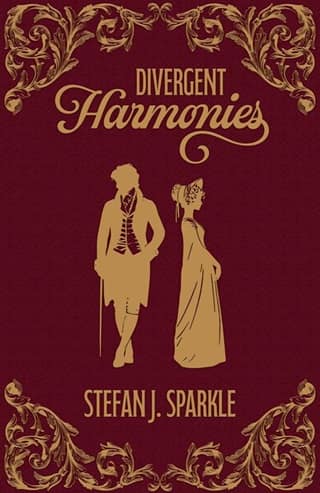Clarinet Concerto in A Major, K. 622 II. Adagio
Charlotte’s eyes widened in astonishment and her maid went red with shock, as Captain Clifton emerged from Miss Hartford’s cottage. Dawn had already lit up the sky with light, and the village was awakening, yet it was still early. The captain paused and appeared to struggle with his whole body for a moment before continuing.
Charlotte’s inquisitive disposition compelled her to reveal herself as he hastened away.
“Good morning, Captain!” called Charlotte with cheer, attempting to belie the bewilderment within.
He pressed on, head bowed and striding with intent, disregarding her greeting entirely. Never before had she been so openly snubbed; the act both irked and intrigued her. What could possibly have occurred between Anastasia and Captain Clifton to warrant such a display?
The ensuing silence was broken solely by the occasional twitter of morning birds and the distant rumble of a carriage as the two women stared after him.
A flurry of questions whirling in her mind, Charlotte smoothed her dark green pelisse and proceeded towards the café, wondering with the maid what it could mean.
“Could it indeed be true? Has he taken his leave from her dwelling at such an early hour?” inquired Mrs Hargreaves, angling her head to ensure the optimal display of her new straw bonnet. It had a lovely purple cawl, with fresh violets adorning the top.
Charlotte nodded, looking out at the clock in the village square. She had indeed noticed the bonnet and privately deemed it somewhat excessive for Mrs Hargreaves. However, noting her dear friend’s evident delight in the accessory, she chose to withhold any comment on the matter, preferring her joy, even though it adhered strictly to the unyielding dictates of fashion. “I dare say it was not even past eight.”
“Eight, you say?” exclaimed Mrs Hargreaves, drawing the attention of several patrons in the café. She lowered her voice, but relished the attention on her bonnet as she set her tea cup down, a happy spark in her eyes. “Most unusual indeed for a gentleman—especially Captain Clifton—to be observed departing from any lady’s residence at such an hour. And our own dear Anastasia—”
Lady Fitzroy interjected with a placid counterpoint. “We must not leap to conclusions. Anastasia has ever conducted herself with the utmost dignity. It is well known that she consistently spurns suitors, preferring solitude, or our company.”
She had graciously presented Mrs Hargreaves with the cawl, and it was a pleasure to witness her friend aglow with joy. The original cawl had been, frankly, dreadful, and Mrs Hargreaves had exhibited considerable distress upon comparing it to the latest fashion depicted in the month’s magazine spread.
“We all remember the ball,” remarked Charlotte, applying a liberal amount of butter to her scone. “The manner in which he and Anastasia regarded one another…”
Her companions nodded, conjuring a similar image in their minds.
“The manner in which they communicated without speaking a single word was truly remarkable,” reflected Lady Fitzroy. “It inspired dreams of a potential romance among us all.”
Mrs Hargreaves, who understood how both of her friends felt about her cawl—and that was precisely why they were all friends—tapped her cup in assent. “And how Captain Clifton fled upon realising we were all observing them. It was unnerving. Have you noticed, since that incident, neither has made an appearance at any subsequent social event?”
“Perhaps he finds society gatherings uncomfortable,” posited Charlotte, unabashedly licking a splotch of jam from the back of her hand. “And since Anastasia lost her dear family, she has shunned societal ostentation. It is possible that they have found that as a connection.”
“Captain Clifton may be more complex than we first surmised,” mused Lady Fitzroy, stirring sugar into her tea. “Our acquaintance with him has been limited, and he is a man who evidently values his privacy. This predilection for seclusion could well explain his early morning visit.”
“And what of his precipitous departure?” said Charlotte, pausing with her scone mid-air. “Had the visit been innocent, why would he have felt compelled to depart with such haste as to disregard my presence entirely?” Cream threatened to slide from the scone, she deftly turned her hand and caught it with her mouth.
“Charlotte Morland!” cried Mrs Hargreaves, scandalised.
Lady Fitzroy’s countenance turned a shade darker as she endeavoured to suppress a snort of laughter.
Simultaneously acknowledging Charlotte’s astute observation with a nod and arching her eyebrows towards Lady Fitzroy, Mrs Hargreaves continued. “That indeed casts the matter in a different light. It is possible that a romance, or at least an amiable companionship, is growing between them.”
“Consider the prospect, ladies,” added Lady Fitzroy. “Would it not be delightful if our dear Anastasia has discovered companionship with one who cherishes life’s simple pleasures as she does?”
“Indeed,” concurred Mrs Hargreaves. “Our duty lies in offering support and understanding, rather than passing judgement. Yet, I must confess that these developments have aroused my curiosity.”
“Do you remember how Anastasia used to speak of marriage and children before the epidemic?” said Lady Fitzroy, not really inquiring, her contemplation meandering through the charming décor of the café as though seeking a memory. “Her words carried a dreamy quality, and her eyes sparkled with aspirations for what was yet to come.”
“A sparkle that dimmed in the wake of her loss,” said Charlotte, her usual vivacity momentarily eclipsed by a sombre tone. “The Anastasia we once knew withdrew into herself and was supplanted by a woman reluctant to re-engage with society, or to welcome the advances of potential suitors.”
“And yet,” said Lady Fitzroy with a serene smile, “to observe her now, possibly re-entering the sphere of romance… it kindles hope, does it not? Perhaps our dear Anastasia is at last allowing herself to cherish her dreams anew.”
 Fullepub
Fullepub 



